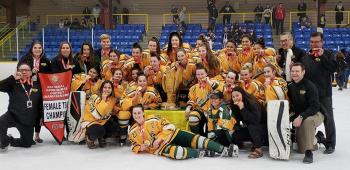Image Caption
Summary
Windspeaker.com Contributor
REGINA
Three previous editions of the National Aboriginal Hockey Championships (NAHC) have been hosted in Saskatchewan.
But this year’s tournament, which runs May 11 to May 16, will mark the first time the tournament will be staged in the provincial capital of Regina.
The NAHC, held annually in various locations across the country since 2002, was first held in Saskatchewan in 2007 when Prince Albert served as host.
Saskatoon hosted back-to-back tournaments in 2011 and ’12.
While in the past some hosts have required the use of a couple of arenas to stage games, Morley Watson, who is serving as tournament chair, is pleased this year’s event will be in one location.
All matches will be held at the Co-operators Centre, which features six ice pads.
“But we’ll only use three ice surfaces,” Watson said. “One for the boys, one for the girls and one for teams to practice.”
All medal and championship finals will be at the Co-operators Centre’s main rink, which has a seating capacity of about 2,000.
Both the University of Regina women’s and men’s hockey teams play their home contests at this facility.
“To have everything under one roof is better,” Watson said. “We have a lot of Elders that come out and watch. It’s just a convenience for them if they can just walk from one rink to the other.”
Watson anticipates some rather large crowds for some of the NAHC contests.
“When Team Saskatchewan plays, I would say we’ll get 600, 700 or 800 people,” he said. “And if Team Saskatchewan is in the finals, I would hope we can fill the arena.”
Watson anticipates several scouts to be in attendance. Those scouts will be representing various Western Hockey League (WHL) franchises.
Other talent seekers from Junior A clubs in the Alberta Junior Hockey League, Saskatchewan Junior Hockey League and Manitoba Junior Hockey League are also expected to take in the action.
That’s because the NAHC, which features female and male Bantam and Midget players ( ages 14 to 17), has seen a number of its former participants go on to play at higher levels.
Some former male participants are even toiling in the National Hockey League now. This list includes Ethan Bear (Edmonton Oilers), Zach Whitecloud (Vegas Golden Knights), Brandon Montour (Buffalo Sabres) and Micheal Ferland (Vancouver Canucks), who has been sidelined for the remainder of this season with concussion-like symptoms.
Numerous others have gone on to play elite levels of junior or university hockey.
Meanwhile, one of the most notable former tournament participants in the female division is Brigette Lacquette, who became the first First Nations player to crack the Canadian women’s Olympic team in 2018.
Watson said tournament officials are pleased they have hooked up with the Regina Pats, members of the WHL.
“The Pats are picking up some of the sponsorship for the tournament,” he said. “And I’m sure they’ll be actively watching the games.”
Watson said other WHL franchises have also been contacted about getting involved with the event.
“We’re hoping all five Western Hockey League teams (from Saskatchewan) will set up a booth and actively scout the participants,” he said.
Other Saskatchewan-based squads in the WHL are the Moose Jaw Warriors, Prince Albert Raiders, Saskatoon Blades and Swift Current Broncos.
A total of 16 squads – eight female and eight male – will compete in this year’s tournament.
They’ll represent eight provinces or regions. Besides the host Saskatchewan squads, others sending reps are British Columbia, Alberta, Manitoba, Ontario, Quebec-based Eastern Door and the North, Team Atlantic and Team North.
Saskatchewan won the gold medal in the girls’ division at the 2019 NAHC staged in Whitehorse. The Saskatchewan boys’ side captured the bronze medal at that event.
Some tryout camps have already been held for the Saskatchewan teams this year. But rosters are not entirely finalized.
Watson said about 26 individuals are still being considered for both the female and male clubs that will represent the province.
A final tryout camp is expected to be held at some point later this month. Following that camp 22-player rosters will be chosen for both clubs.
“We don’t have a long way to go,” Watson said. “We just have a few cuts to make. But the last few cuts are always the toughest.”
Watson said team officials are not in a hurry to stage the final camp as they do not want any players to have conflicts attending that event.
“A lot of our teams are in their playoffs right now,” he said. “We don’t want to disrupt any teams that are in their playoffs.”
Watson said officials from both squads also need to check into the backgrounds of their potential players, to make sure they are faring well in school and have solid recommendations from their communities.
“We expect our kids to be role models on and off the ice,” he said.

